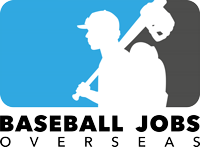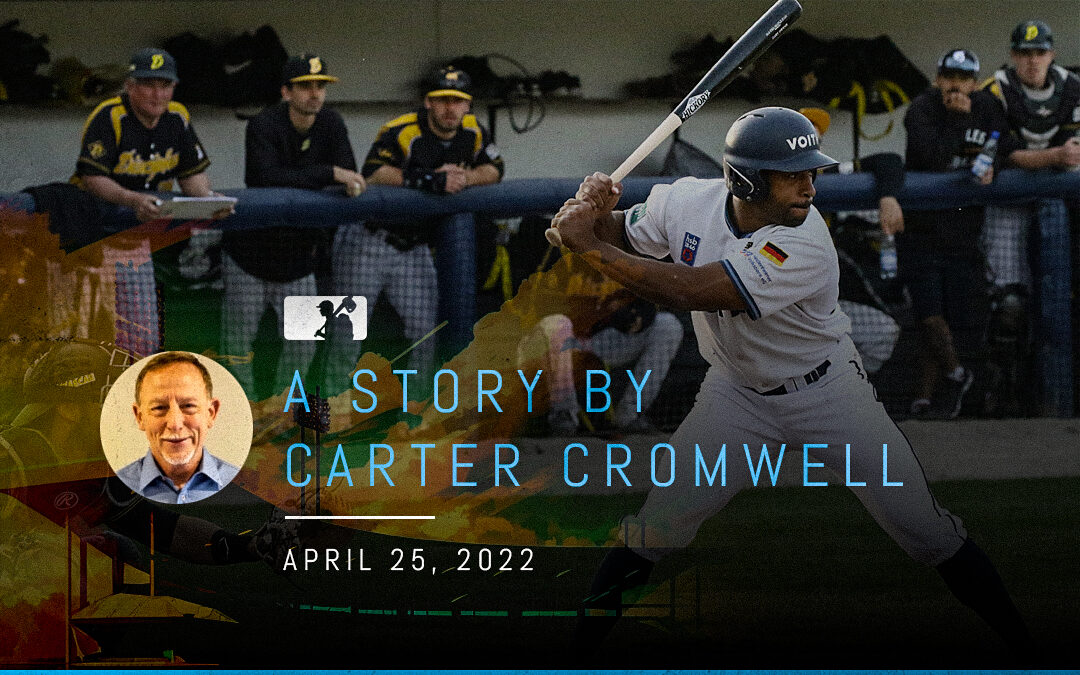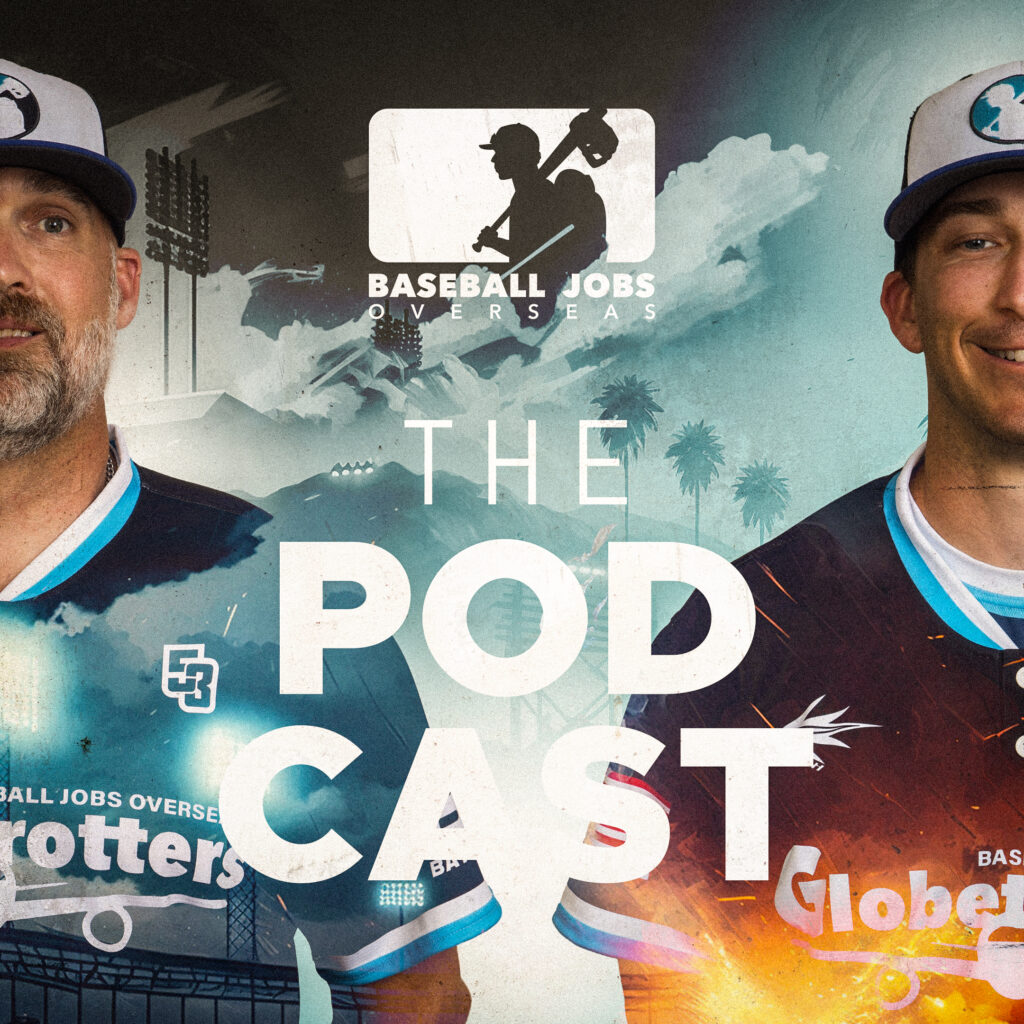By Carter Cromwell
April 25th, 2022
From very early on, Gary Owens had a vision – he knew he wanted to be a baseball player. But he couldn’t envision then how far the game could and would take him.
At the time, his vision extended only to the boundaries of his homemade backyard ballpark, later extending slightly to the nearby elementary school where a team played. As for seeing himself playing collegiately and at various stops on the U.S. independent league circuit and on diamonds in far-flung overseas locales – uh, no.
And yet, that’s what’s happened.
Baseball has taken Owens from that backyard setup in his native Greenville, South Carolina, to college, to a variety of places in the midwestern and southwestern United States and then to Australia and Europe. He played eight seasons in Australia beginning with the 2012-13 campaign and has played in Germany since 2015. Northern Hemisphere summer followed by Southern Hemisphere summer. Then repeat.

Photo: Gary Owens has played in Germany ever since 2015. His last 6 seasons have been with the Heidenheim Heideöpfe, the reigning German Bundesglia Champions as of the publishing of this post. Photo credit: Thomas Schönenborn
And the ride shows no signs of ending. The 2022 season will be his sixth in Heidenheim – champion of the top German Bundesliga in four of the last five seasons and runner-up the other time – and he’s done a star turn each time. He’s also prepared to play again in Australia when Covid-19 loosens hits grip and he can return there.
“It’s just fun to be around the ballpark in any way,” he said.
It’s always been that way.
“When I was really small and in art class in school, all I would draw were baseball fields,” he said. “That’s all I wanted to do. I played at other things, but baseball was the dream, the thing that was important to me.”
“He started when he was maybe six years old with a plastic bat and tennis ball in the backyard,” his father, Milton, said. And he turned his family back yard into that mini-ballpark, digging holes and placing old bricks in them to serve as bases.
“It was great for three-on-three games. We walked off so many paces between bases and said that was enough. The only problem was that trees were in the way, so we had to create some special ground rules,” Owens said.
When he was eight years old, he saw a few kids and an adult taking ground balls on the field of the neighborhood elementary school. He and a friend decided to walk over and check things out, and that led to the next step in Owens’ baseball journey.
“After we’d watched for a few minutes, they asked if we’d like to join them. We threw the ball around, took some grounders and then hit – just having fun,” he said. “Then the one adult – Jeff – asked if he could talk to my parents about having me play on his team, which was a coach-pitch league for seven- and eight-year-olds. My dad and I came out to the next practice, and that was the beginning of my playing days and a still-ongoing friendship with the Llewellyn family.”
Later came high-school ball, during which he earned all-region recognition as a junior. He played football for a couple of years, too, but it didn’t displace baseball. Next was junior college, where he batted .283 and .333 in two seasons, was twice voted the regional pitcher of the week and once named player of the week. Afterward, he moved on to the University of South Carolina-Aiken and finally Southern Polytechnic in Georgia, which since has merged with Kennesaw State University.

Photo: One of the most feared hitters in Germany, Gary is also one of the most liked. Photo credit: Susanne Liedtke
Owens played one season at Aiken and red-shirted the other. During his one active campaign in 2008, he posted a .335/.391/.544 slash line with 12 home runs and 61 RBIs in 64 games. One-third of hits went for extra bases, and, for added measure, he pitched to an 0.68 earned-run average over 13 innings.
Owens, whose father was engineer specializing in piping design for large plants, majored in industrial mathematics, though one could argue that his real major was baseball.
“In junior college, I had a lot of credits toward nothing,” he said. “I went into industrial mathematics when I got to Aiken, but I had to redshirt that one season because I didn’t have enough credits toward a specific degree. I stayed with industrial math when I went to Southern Polytechnic, and I enjoyed it, but I really had no desire to do anything with the degree.”
“I didn’t know what I wanted to do, other than be a baseball player, so I stopped it [college] to go play ball.”
So the journey continued, albeit with some twists and turns, starts and stops, seeming dead-ends and then openings.
Undrafted by a major league team while in college, Owens garnered interest from the Southern Illinois Miners of the independent Frontier League in the United States. He was cut toward the end of spring training in 2011 and returned home to work part-time at a shipping company and give private baseball lessons. He then went to a new league in Arizona but was cut soon after when he sprained an ankle while playing pickup basketball.
In 2012, he got an opportunity to play in the Pecos League, another independent professional league in the U.S., and batted .268 with a .722 OPS for the Roswell (New Mexico) Invaders, who reached the semifinals of the league playoffs. More importantly, the pathway overseas beckoned when teammate Josh Cakebread, a native of Adelaide, Australia, began urging him to play there.
“The first year in the Pecos League was when things started picking up for me,” Owens said. “Josh asked me what I’d be doing in the winter [2012-13] and said they could use me over there. I had nothing else going on, and how many times will you get a chance to go there and play? So that’s when the international thing got going.”
He played for the Port Adelaide Magpies in the South Australian Baseball League (SABL) for two years, except for a short late-season stint with the Adelaide Bite of the Australian Baseball League, the country’s highest league. He followed that by playing and coaching six seasons with the SABL’s Woodville Senators.

Photo: Gary played 6 of his 7 seasons in Australia with the Woodville Senators of the South Australian Baseball League.
After his first season in Adelaide, he played baseball vagabond by returning to the U.S. in 2013 and trying out for the Frontier League team in Florence, Kentucky. He was released by the end of spring training, but was called back later in the season and batted .294 with a .797 OPS in 11 games before again being let go.
He went back to Adelaide for the 2013-14 season, then bounced back to the U.S. for a full season with the Pecos League’s Las Vegas (New Mexico) Train Robbers in 2014. There, he made the all-star team and put up a sterling .366/.441/.541 slash line with 43 RBIs in 51 games and a third of his hits going for extra bases. But . . .
“I enjoyed playing every day and baseball being THE thing, but we were getting paid very, very little and I was starting to age out of the independent leagues,” he said. “I didn’t see things going further than the Pecos League for me, and I thought I should use baseball as a way to travel while I still had the chance.”
Ergo – back to Australia for the 2014-15 season, this time to Woodville, and then came a chance to play with Bad Hamburg in the top German league in the summer of 2015.
“I heard from Kevin Nobles, one of the club managers and also a former player,” Owens said. “He had contacted me before – he’d seen my stats from Australia and also noticed me on Baseball Jobs Overseas – but I had kept saying I wanted to try independent ball in the U.S. By that time, though, I’d gotten tired of being released so I was open to it.”
And he took immediate advantage of the opening. Blew right through it, actually, posting a batting average of .389 with a .478 on-base percentage and .726 slugging mark for an other-worldly 1.204 OPS. He also drove in 23 runs in 28 games and was named to the all-star team.
He moved to the Stuttgart Reds the next season and didn’t slow down, putting up a slash line of .394/.508/.702 and again making the all-star team. He didn’t stop there, though, moving to Heidenheim in 2017 and, seemingly, finding a home. He helped lead the team to the German championship with a .417/.493/.744 slash line, 39 RBI in 28 games, and 11 home runs that tied for the league high. He was named most valuable player of the league’s Southern Division, beating out Triple Crown winner Max Boldt.

Photo: Gary’s big numbers during his sophomore season in Germany with the Stuttgart Reds caught the attention of Heidenheim. Photo credit: Thomas Schönenborn
The 2018 campaign wasn’t much different, except that the club lost to the Bonn Capitals in the playoff finals for the only time in the last five years. Owens batted .467 with a 1.369 OPS and made just one error in 2018, and he continued at that performance level in the last three seasons, batting .398, .378 and .404 with corresponding OPS figures of 1.144, 1.233 and 1.298, respectively.
At the same time, he also coached Heidenheim’s second-Bundesliga team, while also playing for the Woodville club in Australia during the Northern Hemisphere winters. He even served as player/manager for a couple of seasons.
None of which surprises anyone who knows him.
“He has a real love for the game,” his mother Bianca said. “We didn’t push him when he was young, but he always read a lot of books and got a lot of input from his coaches, so it was pretty clear to us that he really wanted to take baseball as far as he could.”
“Gary is very calm and soft-spoken, but he’s very disciplined,” said Simon Guehring, a teammate at Heidenheim who once played in the Milwaukee Brewers system. “That’s stood out for me when he was at Bad Hamburg and we talked after a game. He has a very professional mindset. That’s always a concern we have about imports – whether they’re coming over to play or just to party. But Gary doesn’t drink, doesn’t party. He’s focused on the game and how to make the players around him better. He also understands that local players aren’t professionals; they have jobs or school and can’t train as much as the imports can. Some imports don’t get that.”

Photo: Gary’s trademark is his power, but his speed is another reason why Heidenheim welcomes him back to their line up year after year. Photo credit: Thomas Schönenborn
In assessing Owens as a player, most naturally focus first on his hitting, but he’s also adept in the field and on the base paths.
Klaus Eckle – player, team manager, and general manager at Heidenheim – first connected with Owens when Eckle coached him at the league all-star game in 2015. Heidenheim wanted Owens back then, but it had its quota of imports so nothing could be done. But things opened up following the 2016 season.
“Gary has gotten more selective at the plate over time,” Eckle said. “We got him to use a lighter bat, too, which is easier to handle. He’s worked a lot on hitting to the opposite field, so he’s more accurate now at connecting with pitches on the outside part of the plate. But he’s not just a hitter. He can steal bases, too, and he’s a smart baserunner – uses his speed well. Defensively, he gets a really good jump on balls.”
Guehring added, “You could tell immediately that he was a dangerous hitter. He was in a lineup that wasn’t very strong, so he didn’t have much protection but still did really well. It’s very impressive the way he approaches his at bats. He’s a big, strong guy who tries to hit the ball hard but doesn’t try to hit home runs. In batting practice, he works a lot on hitting to the opposite field. He gets backspin like no one I’ve ever seen. I’ve seen him hit homers that never got very high off the ground. He hits ground balls so hard that they bounce over infielders – we call it the “Gary Chop” or “Gary Single”.
Troy Williams is an American who first went overseas to play in 1990, has coached and taught at the high-school level in the U.S., and both played and managed at Heidenheim. He still works with the club some, also assists with the German senior national and Under-23 teams, and has scouted in Europe for multiple major-league clubs – currently for the New York Yankees.
He calls Owens a “throwback”.
“When you see Gary play – whether he’s in the outfield, running the bases or even waiting in the on-deck circle – it’s like going back in time,” Williams said. “He plays hard-nosed, heads-up baseball and with respect for the opposition. He doesn’t wear batting gloves and all the extra protective equipment. He’s very deliberate and conscientious – he wants to leave the game better with whatever he does.”
Williams sees Owens as becoming even better as time goes on.
“It seems like he’s gained a step over the last few years because he’s smarter, sees the whole field well and knows the competition. In the field, he positions himself well and takes good routes to the ball. He could lose another step or two and still be effective because of the way he plays the game. His baseball IQ could keep him in the game as long as he wants.”

Photo: Heidenheim manager Klaus Eckle congratulates Gary Owens as he rounds third base after hitting a home run in the European Cup in 2021. Photo credit: Heidenheim Heideköpfe
Just how long that will be is indeterminate. Owens, now 35, says he’d “like to push it to at least 40.” Wiliams believes that, “barring injury, he could play past 40.”
If nothing else, Owens will most likely be in Germany for the foreseeable future since he married a German woman back in August. His wife has a daughter from a previous relationship, and the couple is expecting another child in May. As Owens said, “This changes things, big time.”
Ironically, the two met when she was the physical therapist for the team. “We met when I was rehabbing an injury. That worked out,” he said with a laugh.
“That wasn’t in his contract,” Eckle confirmed wryly.
Owens was last in Australia in early 2020. He returned to the U.S. for what he thought would be a short visit with family, but was stuck there for seven months because of the Covid-19 pandemic and therefore got a late start to the 2020 German season. He was eventually allowed to go back to Germany because he was in the long-term relationship with the woman now his wife. He was not able to play in Australia last season or the current one because of Covid restrictions, but he’s getting matters squared away for when he’s able to return.
“I’d like to set it up so I can go back there for a month or so at a time,” he said. “I don’t want Covid to be the end of it. I’d like to go there one more time, at least.”
As for the longer term, he still sees baseball ahead.
“After playing, I’ll try to stick with it,” he acknowledged. “I may try coaching later on, but I want to play as long as possible. Baseball is a hard thing to shake. You grow up with a toy stick for a bat, work up to a metal toy, then to a fungo bat and then to a real bat. You’ve played the game since you were a little kid, and then someone tells you that you need to grow up.
“That doesn‘t come easy.”
Travel the world using baseball or softball as your ticket
Our baseball and softball members get paid to play or coach overseas year-round, mostly in Europe and Australia.
There are a variety of levels overseas which present opportunities for both the college grad and the established professional.




 Moonshot is a baseball apparel company based out of Mannheim, Germany, and is owned and operated by a good friend of ours, Juan Martin. What separates Moonshot from the other companies we have used in the past, is the value for your money and the customer service. You will not find prices like this in Europe or someone that responds faster.
Moonshot is a baseball apparel company based out of Mannheim, Germany, and is owned and operated by a good friend of ours, Juan Martin. What separates Moonshot from the other companies we have used in the past, is the value for your money and the customer service. You will not find prices like this in Europe or someone that responds faster. 
 High end, professional wood and composite bats with a wide selection of models using many different types of wood from Japan, North American and Taiwan. Hakusoh Bat is approved with the WBSC and across Europe.
High end, professional wood and composite bats with a wide selection of models using many different types of wood from Japan, North American and Taiwan. Hakusoh Bat is approved with the WBSC and across Europe. 




